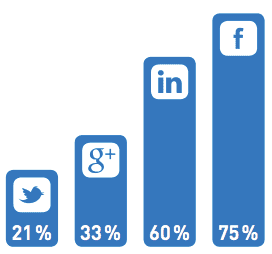The following article is archived and is no longer considered up-to-date. Please interpret its content in the context of the publishing date.

ARCHIVED
Economists and Social Media
Read a summary using the INOMICS AI tool
* The original article was published in the INOMICS Customer Newsletter. Click here to subscribe.
Are academics too smart and busy to become active participants in the share-and-like race on social media platforms? To answer this question exactly one year ago we surveyed 340 economists who visited the INOMICS platform. The majority of economists who responded to the survey (87%) were employed in Universities, Research Institutes/Think Tanks or Government. Given the global nature of internet space and keeping in mind that the use of the social media platforms may vary from country to country, we ensured a fair representation of all regions among the respondents, with 63% of respondents still being based in Europe.
What did economists share with us about their use of social networks? Twitter was reported to be the least used by the economists with only 21% of the respondents having an account. 62% of those economists who do use Twitter use it for professional networking, while 38% use it solely for private purposes. Google+ had a slightly higher use (33% of respondents) and is used by equal numbers of economists for professional and private purposes. Not surprisingly, LinkedIn, used by 60% of survey participants, was mostly kept for professional networking. Surprisingly, none of the economists surveyed mentioned any professional platforms created specifically for academics.
Facebook is an obvious exception in the types of social media used by economists. Despite continuous predictions of the coming fall of the “like button” monopolist, which are supported by the declining numbers of Facebook users, it remains the most used social media platform regardless of professional profile of users. Moreover, as online communication methods are increasingly becoming the norm, user behavior is changing. According to last year’s survey, 60% of economists still used Facebook for private purposes only, but the growing number of jobs and academic conferences shared suggests that private and professional spheres in the online world are currently not that isolated from each other. And while from the privacy point of view it is perceived by many as a negative side effect of social networks, it has its obvious advantages, too. An opportunity to connect with people in your professional community regardless of their geographical location and school of thought can have an enhancing effect on both career and personal development, whereas trust and accountability increase proportionally to the number of shared connections. If it has to be done on another platforms, created for these professional communities and networking only, is another question – especially if predictions about Facebook fall come true.
Being a platform for economists, here at INOMICS we have the privilege to watch these trends in the context of the economics community ourselves. Since April last year the INOMICS Facebook page has grown by 100%, and also demonstrated a disproportional increase in fans activity. Users are engaging significantly more actively in the professional discussions and are sharing related information with their private networks.
The trends in web platforms use are changing with amazing speed, as do the platforms themselves. Given the changing landscape of professional networks for academics, we have added extra dimensions to our survey this year.
-
- PhD Program, Program, Postgraduate Scholarship
- Posted 2 weeks ago
PhD Program in Economics - 6 Fully Funded Scholarships
at Luiss Guido Carli University of Rome in Rome, Italy
-
- Postdoc Job
- Posted 1 week ago
Postdoctoral Research Fellow Opportunity
At University of Notre Dame in Notre Dame, United States
-
- Assistant Professor / Lecturer Job
- Posted 1 week ago
Visiting Assistant Professor - Economics
At Boise State University in Boise, United States













